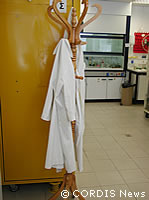Study reveals the 'push' and 'pull' factors behind brain drain...
A pilot study supported by the European Commission has concluded that access to scientific equipment and technology is one of the main factors influencing researcher mobility and, as a consequence, brain drain. The study collected responses from researchers with a history of mobility in Italy and Hungary, as well as members of the American association for the advancement of science (AAAS). The responses to the different questionnaires were consistent, identifying a number of 'push' and 'pull' factors that affect researchers in their decision to move to a foreign country or to return home. While scientific equipment and access to technology were quoted as sending foreign researchers to Italy and EU-born researchers to the US, salary levels were not highlighted as an important consideration. What was surprising, according to one of the project coordinators, Wendy Hansen, was exactly how willing Europeans are to go far a field, and the number who have no plans to go home. Ms Hansen also highlighted the relatively minor effect that having children has on European researchers abroad, compared with American researchers abroad. Whereas many Americans would consider going home at this point in their lives, 'Europeans are fine out there in the world,' Ms Hansen told CORDIS News. Ms Hansen was also 'shocked' by the implication inherent in the results that women are still choosing between a career and a family. The study showed that women are far less engaged in international mobility than men. Administrative or bureaucratic barriers continue to be problematic as far as mobility is concerned, and more so in Europe than the US. Some countries have, however, begun to introduce measures to eradicate this. The UK, for example, has introduced a permit system for health and medical services workers, Ireland is fast tracking skilled foreign workers in particular sectors, and Portugal is granting scholarships to support postdoctoral research by foreigners within its borders. The pilot study shows that most researchers who move abroad heard about the opportunity through networking or informal information services. Western Europeans are also likely to learn of positions through the Internet, while Central and Eastern Europeans are more likely to find vacancies in journals. Asked whether brain drain is given equal attention in the US as in Europe, Ms Hansen said that the US National Science Foundation does discuss the topic, as it is very concerned about increasing or maintaining its intake of foreign researchers. Being the first of its kind, the study is an extremely useful indicator of the factors influencing brain drain. However, those involved in its implementation propose that more research be carried out on the subject, possibly by asking foreign researchers to fill out a questionnaire when they arrive in Europe for a research posting. 'This would not be an additional burden for the researcher, but a means of providing policy with feedback, and from our survey experience, we project a high response rate,' state the study conclusions.



